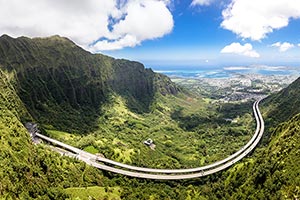Mock Bills Could Gauge Hawaii Mileage Tax

The more than 1 million Hawaii drivers who get annual vehicle inspections could soon receive mock bills comparing what they pay in state fuel taxes to what they would pay if taxed on the miles they drive instead.
It would be a first step Hawaii makes to join other states considering how to overhaul their road-repair funds now that cars are becoming more fuel-efficient and the gas tax revenues for those repairs are dwindling.
State Department of Transportation leaders proposed the mock bills Oct. 6 in Waikiki, where they met with lawmakers and local transportation groups to discuss replacing the gas tax with a mileage, or “road-user,” tax.
The agency received a nearly $4 million federal grant last month — reportedly the largest amount for any state — to study the issue over the next three years or so.
Once all of the state’s drivers receive their mock bills [which would rely on odometer readings from vehicle inspections], DOT proposes to recruit volunteer drivers for a pilot program to test how to administer the mileage-based tax.
“It makes the most sense to look at the broad base first,” DOT Highways Deputy Director Ed Sniffen said Oct. 5. “Then we can start drilling down to smaller groups to ensure that we understand how the processes need to be set.”
There’s no timeline yet for the study, but Sniffen said his agency could have its findings ready by 2019 for the state Legislature to consider replacing the gas tax with a mileage tax.
Such a tax change could see hybrid- and electric-vehicle owners paying more to maintain the roads they use, while gas-guzzling car and truck owners could find they would pay less than under the fuel tax, officials said.
On average, the fuel tax has Hawaii drivers paying 0.8 cent for each mile they drive, Sniffen said. That’s not the rate DOT would necessarily use for a new mileage system, he added.
As DOT studies the mileage tax, “they’re still going to come in for a fuel tax increase” next year, Rep. Sylvia Luke (D- Punchbowl-Pauoa-Nuuanu) said Oct. 10. The agency’s leaders said they need more funds to fix existing roads and build new ones. The Legislature rejected a proposed fuel tax increase earlier this year.
“I’m a little bit concerned that people are going to confuse the two issues. They need to do a good job in making sure those are separate issues,” Luke, who chairs the House Finance Committee, said of the proposals to increase the fuel tax and replace it with a mileage tax sometime later.
The state’s gas tax dollars make up 33 percent of its highway fund, which goes toward road projects and repairs. However, consultants for DOT reported Oct. 5 that annual gas tax revenues have “flattened” to around $85 million since 2012, largely due to more hybrid and fuel-efficient cars on the road.
Those revenues could start to decrease as cars guzzle even less gas, requiring the DOT to raise the fuel tax some 18 cents a gallon by 2035 to keep up with road costs, consultants with the Washington, D.C.-based transportation firm D’Artagnan Consulting said.
Currently, the state’s fuel tax is 16 cents per gallon.
Some at the meeting expressed concern that rural and lower-income drivers would be harder hit by a mileage-based tax because they typically have to commute longer distances.
However, Hawaii’s rural drivers are driving much less fuel-efficient cars than those in the urban core, according to an analysis that D’Artagnan ran using local car registration data and those cars’ average miles per gallon.
Because they drive gas-guzzlers and buy more gas, they would likely still benefit from a switch to the mileage tax, D’Artagnan partner Travis Dunn said.
“People would pay for [road] usage, like water and electricity,” he said.
Privacy concerns over the devices used to monitor whether a car is logging miles out of state have already come up on the mainland. However, Hawaii could avoid those issues because it’s isolated from other states and officials wouldn’t have to track out-of-state miles, Sniffen said.
Instead, the island state could simply rely on the odometer readings from annual safety checks — although Sniffen said the state could give drivers other options if they preferred.
The move to a mileage tax could discourage some drivers from buying an electric or hybrid car, but the tax is still better for the environment because it helps to make the state’s taxes less dependent on gas sales, Blue Planet Foundation’s clean transportation director, Shem Lawlor, said Oct. 5.
“The sooner we move off of fuel tax as the base funding system for maintaining our roads, the sooner we enable a future in which we can go all-electric, or all nonpetroleum vehicles,” Lawlor said.
Hawaii consistently ranks at the bottom nationwide for its road and traffic conditions, but some lawmakers questioned whether a fuel tax hike would translate into better roads.
The proposed gas tax hike that the Legislature rejected during its most recent session was expected to increase costs for a typical motorist by about $83 a year. Gov. David Ige has said he plans to push for the gasoline tax increase again next year.
DOT currently spends about 90% of its roads program on maintenance and safety and 10% on costlier new road projects, Sniffen said. The agency will collect feedback from the groups it addressed Oct. 5 before moving forward with the mock bills, he added.




